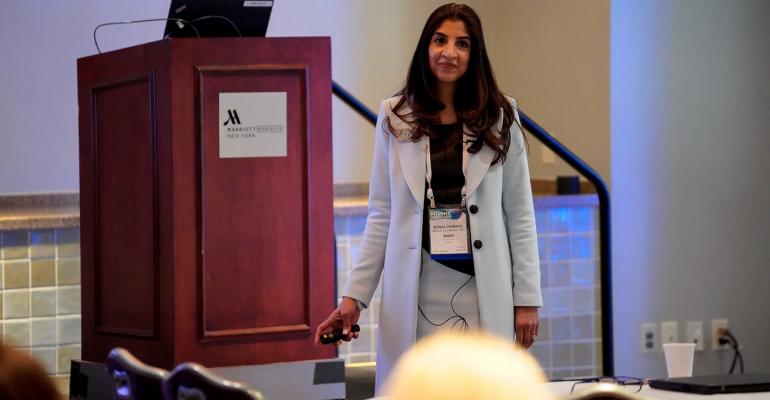Compliant, customer-focused, and consistent.
Those are the standing orders for members of the meeting-planning team at Merck & Co. as they coordinate hundreds of events around the world each year that train doctors on the clinical trial protocol for various Merck products. Some of those products are new, while others are already established for particular uses but require new trials for alternate uses.
At the recent Pharma Forum 2019 in New York, co-hosted by CBI and MeetingsNet, Sonal Humane, director of meeting management for Merck, told attendees that "investigators are drawn to these events for the science." But before the firm's planners focus on the scientific element for each investigator meeting, compliance comes first.
To approach compliance comprehensively, Merck considers three different areas.
Internal compliance: This includes meetings policy, travel policy, privacy and data protection policies, and brand requirements. For example, "Merck teal" is a color with specific RBG values, and it is used exclusively to identify Merck in all print, online, and on-site materials.
Country requirements: Investigator meetings must adhere to the policies of the HCP’s home country, which typically include a specific meal cap and possibly rules on what class of airline seat and hotel star rating are allowed.
Industry compliance: These meetings must also conform to the guidelines and transparency reporting mandated by the International Council for Harmonisation of Technical Requirements for Pharmaceuticals for Human Use, or ICH.
From there, Humane's focus is on the attendee experience within each event to build buy-in and promote learning. "It's important to give these doctors the background of where the drug fits into the entire protocol, and not simply push the protocol," Humane explained. To help with this, Merck brings in doctors who participated in earlier trials to talk about their experiences in choosing patients to enroll and why, as well as the challenges they faced. Humane also noted that oncology trials are more complex for HCP offices to administer than diabetes and cardiovascular trials; therefore, having doctors on hand who have conducted an oncology trial is especially helpful. In fact, "a presenting physician who manages the protocol will do breakfast sessions with small groups, and attendees love that. We want to show doctors how to apply the protocol through real-life examples whenever we can."
Improving Delivery
Another way Merck refines the investigator learning environment is through speaker training. "We guide presenters on slide graphics and aesthetics because the most important thing is that they do not simply read their slides," Humane said. "Speaker training is difficult because scientists are very smart but often are not polished speakers. Giving them detailed feedback is a bit uncomfortable but it's critical, especially if English is not their first language or is not the audience's first language. For presenters, pace and cadence plus staying on key themes relevant to the protocol is essential to the audience understanding what we need them to understand."
To reinforce the need to stay on point, Merck has removed as much generic session content from investigator-meeting agendas as possible, which in some cases reduces the event to a single day and thus draws more doctors. Humane said that e-books are one solution Merck has used successfully to deliver non-protocol-related content that the company wants doctors to know.
One thing that Humane avoids is asking a presenter to also handle the duties of event chairperson or facilitator. "While you need someone to keep the event running on time and ask questions of the presenters, it confuses the audience to have a presenter take on both roles," she noted. "An external doctor who is media-trained is the best option for chairperson, though that's not always possible. In any case, we try to get someone who is from the same country as the audience to act as chairperson."
The chairperson's other key role is to make sessions engaging and interactive by initiating conversation, and by leading attendees through knowledge checks. Humane said that Merck has been using iPads for a little more than a year to conduct knowledge checks in each session, with good results.
 One other element that contributes to building a customer-focused event and getting the desired results from that event is consistency. For example, "branding inside the U.S. is often different than outside the country for the same product, so we check all the marketing materials for each event to make sure the messages and aesthetics match everything else that's being used there," Humane said.
One other element that contributes to building a customer-focused event and getting the desired results from that event is consistency. For example, "branding inside the U.S. is often different than outside the country for the same product, so we check all the marketing materials for each event to make sure the messages and aesthetics match everything else that's being used there," Humane said.
Consistency is also implemented across the virtual complements to in-person events. "Every one of our live meetings is hybrid," Humane said. "We also did nearly 400 virtual events last year that addressed protocol changes. These get registered in our SMM program, and the invitations and materials are uniform" to ensure all doctors have the same investigator-training experience.





